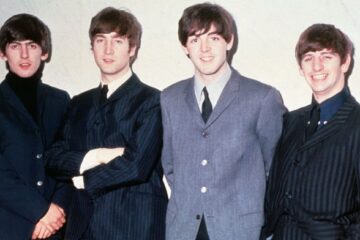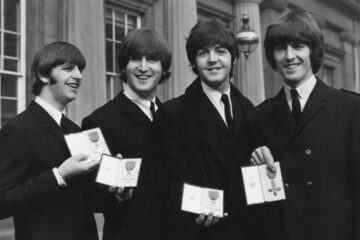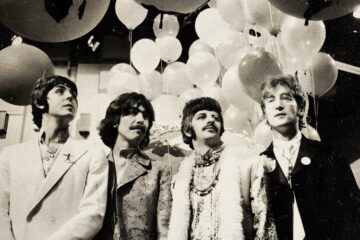News The Beatles songs that will stand the test of time, according to Paul Simon
Paul Simon and The Beatles shared a complex relationship. While Simon was an admirer of the British group, acknowledging their undeniable significance in the 1960s, he had reservations about John Lennon’s solo work. This led to some contentious exchanges, with Lennon making offensive remarks about Simon’s height. However, on one occasion, when discussing The Beatles, the songwriter of ‘The Boxer’ articulated some insightful truths about the nature of their work.
As one of The Beatles’ greatest strengths was being able to pull from the influence of others and create something utterly fresh sounding when put through the prism of their members, they also explicitly looked to the work of Simon and Garfunkel when writing their masterpiece ‘Let It Be’. According to Lennon, in 1980, Paul McCartney was inspired by the duo’s stirring ‘Bridge Over Troubled Water’ when writing their own swansong, which also materialised amid ample personal distress.
This must have been music to the ears of Paul Simon, who had already been callously dismissed as the “singing dwarf” by Lennon in a bitter interview in 1979, wherein he criticised his former partner McCartney, as well as Mick Jagger, Bob Dylan, and even celebrated writer Truman Capote.
To mount a flimsy defence for the former Beatles leader regarding the folk hero, it must be said that Paul Simon had criticised his solo efforts during a sprawling 1972 interview with Rolling Stone. For content, at this point in time, the end of the quartet had only just occurred two years prior, and while it had been a long time coming, things became acrimonious as Lennon and McCartney fired shots at each other on their respective 1971 albums, Imagine and Ram, something which was initiated by McCartney slamming Lennon in the song ‘Too Many People’.
Lennon coveted his solo career more than anything else as he was bitter and felt threatened by other musicians, not to mention his former bandmates. Furthermore, his experience with The Beatles was now blighted, so he didn’t respond to criticism of his new work kindly. There’s no real surprise then, that Lennon sucker punched Simon in 1979, as during the American’s interview seven years prior, he had taken issue with the Englishman’s song ‘Power to the People’, calling it a “poor record, a condescending record” and even “dangerous”.
Simon maintained that he didn’t have issues with Lennon as a person or with his intentions, but when asked, he opined that some of his work had been misguided. He said: “Some have been in bad taste. Others have been courageous. I think he’s generally a well-intentioned guy.”
What is interesting about Lennon’s comment about Simon is that despite criticising that one song, Simon had praised The Beatles greatly. Evidently, that would have meant very little to their former leader, but it seems strange to disparage someone who had been so publicly kind about his most culturally valid efforts.
Asked to name The Beatles songs that would stand the test of time, Simon presciently cited three that have pierced the cultural fabric greater than most, with markedly different sounds, before stating that the group had such a wealth of incredible music that it was impossible to pick the best. These were just a flavour of The Beatles’ power.
“I would pick ‘Yesterday,’” he said. “I would pick ‘Strawberry Fields [Forever]’ — although there is your example of a total record. A very important record to me, I like it a lot. You can’t even sing the song. It’s really hard to sing the song.”
“It may take a song instead of being dated after three years, maybe some songs won’t be dated for five years,” he added. “Eventually, all records are dated, but the song comes back. ‘Eleanor Rigby’ was a really fine song. There’s no way of picking out the best songs.”
Elsewhere in the interview, Simon described The Beatles as “great” and noted their brilliance as writers and performers, which he labelled a rare coupling in music, before outlining the small handful of those who he thought did both, including Aretha Franklin and Otis Redding.
All in all, it was very high praise from Paul Simon. He was correct about The Beatles songs he chose, regardless of what Lennon might have thought. ‘Yesterday’ might well be the most resonant rock ballad in history, a global number one that ranks among one of the most covered tracks, and continues to hold meaning for those whose parents weren’t even alive when it was released. That’s the sign of an unremittant classic. As for ‘Strawberry Fields Forever’, it is a distillation of the immense psychedelic innovations the band instituted when they were all working in tandem, and ‘Eleanor Rigby’ is one of the earliest additions to the genre that became known as art rock, characterised by accomplished and surreal Baroque strings.
The Beatles were masters who defied the passage of time, and the ‘Cecilia’ songwriter knew it. I wonder whether Lennon did, too, or if he was too bogged down in resentment. It seems his opinion would oscillate depending on the day.




